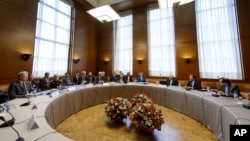Iran and world powers will meet again in three weeks' time to continue what both sides are calling "substantive" negotiations to address international concerns about the country's nuclear program.
In the meantime, nuclear, scientific and sanctions experts will work to address the differences that have made the standoff stretch on for more than a decade.
The United States, Russia, China, France, Britain and Germany want Iran to prove it is not developing nuclear weapons, while Tehran is seeking relief from international sanctions aimed at forcing it to halt uranium enrichment activities.
Iranian Foreign Minister Mohammad Javad Zarif said on Wednesday, after two days of talks in Geneva, that he hoped the negotiations will mark the beginning of a new phase in what he called an "unnecessary crisis."
"There are more important issues that we need to deal with and the right of Iran to pursue nuclear technology for peaceful purposes including enrichment can in fact be exercised with the necessary political will without any proliferation concerns and that is what we are going to move forward and achieve in my view," said Zarif.
White House spokesman Jay Carney said the Geneva talks show "a level of seriousness and substance that we have not seen before," but warned against expecting a "prompt breakthrough" in the nuclear talks. He referred to a history of mistrust between Tehran and the West that he described as "very deep" and said U.S. analysts will also study details of private Iranian proposals to end the nuclear stalemate.
Senator Marco Rubio sought to keep pressure on Iran by introducing a non-binding resolution calling on Congress to adopt further sanctions if Iran does not give up its nuclear program. He said in a statement that Iran has "broken its word far too many times to be trusted."
Iran has long insisted its nuclear program is peaceful.
Rubio's action follows a group of 10 senators who sent a letter to U.S. President Barack Obama earlier this week saying they are open to suspending any new sanctions if Iran takes significant steps.
Details of the latest Iranian proposals have not been made public, but Tehran has said it would not accept earlier demands from the so-called P5+1 grouping to suspend uranium enrichment or to ship stockpiles of processed uranium abroad.
Those demands also include Iran's compliance with a comprehensive verification regime - with unannounced checks by U.N. inspectors - and a reduction in Iran's level of uranium enrichment.
Earlier Wednesday, Iran's state-run news agency IRNA quoted Deputy Foreign Minister Abbas Araqchi as saying neither inspections nor uranium reduction issues have yet been addressed by Iranian negotiators. However, other Iranian officials say they will be presented in the second and third phase of negotiations.
The Geneva talks are the first since relative moderate Hassan Rouhani was elected Iran's president in June. He promised to lead a diplomatic effort to get economic sanctions against Iran eased, but P5+1 officials have said Iran must prove its sincerity through concrete steps before that will happen.
In the meantime, nuclear, scientific and sanctions experts will work to address the differences that have made the standoff stretch on for more than a decade.
The United States, Russia, China, France, Britain and Germany want Iran to prove it is not developing nuclear weapons, while Tehran is seeking relief from international sanctions aimed at forcing it to halt uranium enrichment activities.
Iranian Foreign Minister Mohammad Javad Zarif said on Wednesday, after two days of talks in Geneva, that he hoped the negotiations will mark the beginning of a new phase in what he called an "unnecessary crisis."
"There are more important issues that we need to deal with and the right of Iran to pursue nuclear technology for peaceful purposes including enrichment can in fact be exercised with the necessary political will without any proliferation concerns and that is what we are going to move forward and achieve in my view," said Zarif.
White House spokesman Jay Carney said the Geneva talks show "a level of seriousness and substance that we have not seen before," but warned against expecting a "prompt breakthrough" in the nuclear talks. He referred to a history of mistrust between Tehran and the West that he described as "very deep" and said U.S. analysts will also study details of private Iranian proposals to end the nuclear stalemate.
Senator Marco Rubio sought to keep pressure on Iran by introducing a non-binding resolution calling on Congress to adopt further sanctions if Iran does not give up its nuclear program. He said in a statement that Iran has "broken its word far too many times to be trusted."
Iran has long insisted its nuclear program is peaceful.
Rubio's action follows a group of 10 senators who sent a letter to U.S. President Barack Obama earlier this week saying they are open to suspending any new sanctions if Iran takes significant steps.
Details of the latest Iranian proposals have not been made public, but Tehran has said it would not accept earlier demands from the so-called P5+1 grouping to suspend uranium enrichment or to ship stockpiles of processed uranium abroad.
Those demands also include Iran's compliance with a comprehensive verification regime - with unannounced checks by U.N. inspectors - and a reduction in Iran's level of uranium enrichment.
Earlier Wednesday, Iran's state-run news agency IRNA quoted Deputy Foreign Minister Abbas Araqchi as saying neither inspections nor uranium reduction issues have yet been addressed by Iranian negotiators. However, other Iranian officials say they will be presented in the second and third phase of negotiations.
The Geneva talks are the first since relative moderate Hassan Rouhani was elected Iran's president in June. He promised to lead a diplomatic effort to get economic sanctions against Iran eased, but P5+1 officials have said Iran must prove its sincerity through concrete steps before that will happen.





